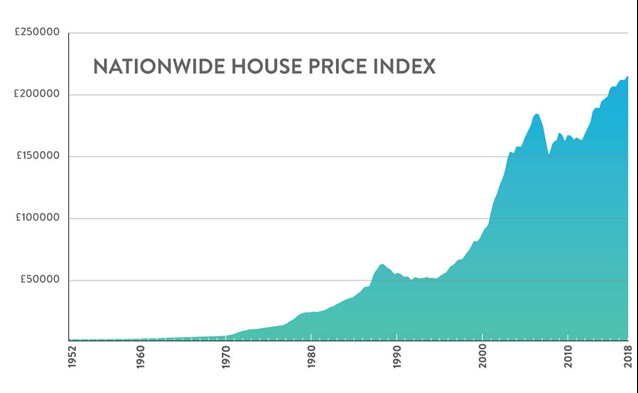UK house prices have increased fairly consistently since 1980. Whilst there were drops in the early 1990s and during the Financial Crisis of 2008-09, over the course of the last 38 years, there has been significant growth in house prices, even after allowing for the impact of inflation. Thirty-eight years ago, a house in the UK cost on average £23,3481. Today the average price is £214,5781. With house prices increasing like that, investing in bricks and mortar appeals to many would-be investors, if only buying property wasn’t so lengthy and complicated! The fact is, it doesn’t always have to be. We look at the various paths you can take to invest in property and what to consider along the way.
1: Nationwide – UK house prices since 1952

Property’s Popularity
Property investment might suit a broad range of requirements, thanks to the various ways you could earn a return on your investment. Owning a property doesn’t necessarily mean you need to live in it. Whilst most property owners settle in their house, others choose to rent out their property to earn a regular income. At the same time, capital accumulation – where a house rises in value over time – can give property investors a positive return over the long-term. The average detached home in Kensington and Chelsea was worth £715,4882 in April 1998. 20 years later, the same property was worth £3,537,029.2. Closer to home, an average detached house in the Vale of Glamorgan rose from £101,7052 to £374,4442 over the same period. If you don’t want to wait 20 years for a return, you might be able to increase the value of your property sooner with a full-scale refurbishment, perhaps adding a swanky modern extension complete with bi-fold doors. Programs like BBC’s Homes Under the Hammer and Channel 4’s Property Ladder have helped turn the UK into a nation of property developers and renovators over the past 20 years. Bear in mind that refurbishing a home can be extremely hard work and expensive, and there’s no guarantee you’ll make a return after taking account of the costs. A study found that on average property renovations in the UK cost around £23,1003.
2: Land Registry - Compare UKHPI statistics across locations
3: Foxtons, Sep. 2017 - UK homeowners spend £23,000 renovating their home
Rising house prices over the last two decades have driven up demand for property amongst investors but what’s driving these persistent increases? House construction has remained quite stagnant over the last decade: 214,9404 houses were built in England in 2006/07, compared to 217,3504 homes in 2016/17. This means that in 10 years, the increase in the annual supply of homes was just 2,410. Historically low interest rates (actual and factoring in inflation) alongside a growing population means there’s an increasing number of Brits for whom home ownership might be an affordable dream, resulting in additional demand on already thin housing stock and supporting rising prices.
Multiple investing routes
Direct routes
You could buy residential property directly, either to live in or let out to tenants (whether council, private or student housing). You could also buy and let commercial property such as offices, industrial units or commercial storage. With a direct investment, you typically have more control since you own a physical asset, but buying property is no easy task. Here are some things to consider:
- In most cases, unless you can afford to pay the full purchase price (and associated costs) outright, you are likely to require a mortgage which means making regular repayments to your lender, with interest charged on the amount you borrowed. Your repayments might also increase if interest rates rise, particularly if you choose a variable rate mortgage. You should carefully consider all costs and likely scenarios when budgeting for your investment, to make sure your returns will cover your costs.
- Buying a property can be expensive. The average house price in the UK is around £226,0715 and the typical deposit is 17%6 of the cost, meaning you might need to find around £38,432.
5: Metro - What is the average house price in cities across the UK?
- Changes to tax rules introduced in 2017/18 have lowered the amount of tax relief landlords can claim on mortgage interest and from April 2020, tax relief on income from property will only be available at 20%, rather than the 40% rate, which may lower your incentive to become a landlord7.
6: Government website - Restricting finance cost relief for individual landlords
- Selling a property isn’t a fast process. Your money is tied up and it takes more time than most other investments to release your money. You also might not be able to release some equity (to withdraw cash) so it might not be a suitable investment if you need access to your money at short notice.
- By buying a single property, you are putting all your eggs in one basket, so to speak. This can increase your exposure to risk since your investment depends on that one property turning a profit – and things can go wrong!
- House prices typically don’t go up indefinitely. If the 2008 financial crash taught us anything, it is that you need to be prepared to face the bumpy periods. This could mean holding onto your property over the long-term to ride out the ups and downs of the housing market.
Indirect routes
You don’t actually need to buy a physical house to invest in property. There are other ways to invest indirectly.
Collective Investments Vehicles
One route is to invest in Real-Estate Investment Trusts (REITs). These are investment funds whose focus is to invest in a range of different properties in line with the aims of the fund. Whilst some REITs hold properties from one specific region or area of real estate (e.g. only shops), others are more general and offer greater diversification, containing properties of different types and varied geographies. Opting for a REIT can allow you to spread your money across a large number of properties, which can help lower your risk.
Unit Trusts are another way to invest in property. They work like mutual funds (hampers containing a large range of pre-selected investments). Just like REITs, Unit Trusts can be a good way to diversify your portfolio and spread your risk, as your money is invested across different places and assets.
Investing in property companies and house builders can be a quick way to gain exposure to large parts of the property sector rather than owning a house, with companies constructing various types of properties across multiple regions in the UK and beyond, with any returns linked to the success of the companies themselves, rather than house prices.
Peer to Peer Lending
It’s now possible to invest in property using a peer-to-peer platform. Simply put, an online peer-to-peer platform allows you to lend money to individuals (home buyers) and/or businesses (housing companies or corporations), and in exchange borrowers commit themselves to reimburse you and pay interest on the loans. This investing strategy has consequently evolved with the launch of Innovative Finance ISAs in April 2016. These enable investors to lend via FCA regulated peer-to-peer platforms without paying income or capital gains taxes on returns. However, peer-to-peer platforms can leave you exposed to default risk as most other loans do.
How Wealthify invests in property
If you choose to take the indirect route to invest in property, you could do it yourself, conducting your own research and making investment decisions accordingly and, maybe selecting equities, REITs or Unit Trusts directly from fund providers. If you’re too busy or not confident enough to analyse markets and select your own funds, you could let online investment management services, like Wealthify, do the hard work for you.
Figures in this blog are based on past performance and past performance is not a reliable indicator of future results.
The tax treatment depends on your individual circumstances and maybe subject to change in the future.
Please remember the value of your investments can go down as well as up, and you could get back less than invested.



